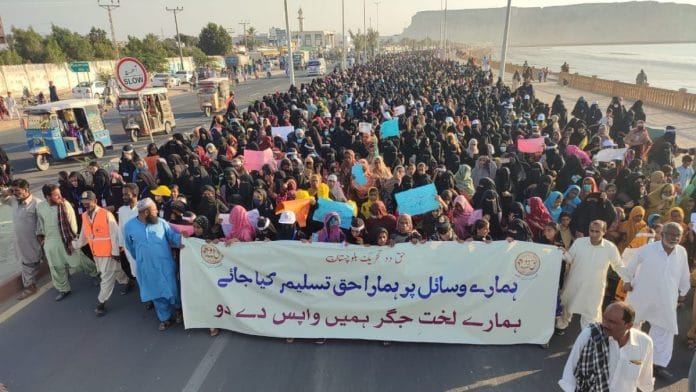New Delhi: For the past two months, protesters in Pakistan have blocked the Gwadar East Bay Expressway in Balochistan, an area crucial to Pakistan-China relations. Gwadar port city is the nucleus of China-Pakistan Economic Corridor, and joins the country’s main highway network.
Part of the Haq Do Tehreek movement led by Maulana Hidayatur Rehman, Pakistani protesters have been sitting at the port’s entrance, demonstrating against the deep-sea fish trawling ruining livelihoods of local fishermen, the removal of needless check posts, and for better access to education and electricity. On Monday, leader Husain Wadala and seven of his supporters were arrested.
China-Pakistan Economic Corridor (CPEC) is a collection of collaborative infrastructure projects currently underway in Pakistan to improve trade with China. Established in 2013, the deal took off when Nawaz Sharif was prime minister. The blocked expressway leads to the port and the under construction Gwadar International Airport, all of which are part of the $50 billion CPEC.
Reports say while these demands are not directly linked to Chinese projects in Gwadar, residents consider the developments to be part of the problem.
Also read: Pakistan can’t catch a break. IMF won’t give loans to ‘clear debt’. China won’t start CPEC
Takeover of fisheries
The takeover of Pakistan’s fisheries and consequent loss of livelihood has been directly linked to the Chinese.
“If it means their trawlers will eat up more of our fish stock, we don’t want any investment or assistance from the Chinese,” a local leader in Gwadar had said when CPEC was still in preparation stage.
A Chinese diplomat had mentioned China’s plans to expand into Pakistan’s fishing industry. “You [Pakistan] have rich resources when it comes to fisheries… Chinese investors are very much interested in investing in the fishing sector in Pakistan,” said Consul General Li Bijian. Between January and September 2022, Pakistan’s seafood exports to China reached $141.57 million, a 34 per cent increase from the previous year.
Rehman has said that if citizens’ demands are not accepted and an agreement with the Haq Do Tehreek is not reached, these lucrative projects will be shut down. Rasheed Baloch, a political analyst based in Quetta, said the movement is sending China a message that things are going south in the city that has been publicised as the heart of the CPEC.
“There is no doubt that Beijing is worried due to the increasingly hostile attitude of Rehman toward Chinese interests in Gwadar,” he told Nikkei Asia.
The protesters have now upped the ante by demanding that the 500 Chinese citizens who reside in the Gwadar Port compound leave. Pressure on the Pakistan government is mounting – the cash-strapped state needs China in its corner.
Reports say that China is “frustrated” with Gwadar’s slow progress. Pakistan has only completed three CPEC projects in Gwadar as “one-dozen projects costing nearly USD 2 billion remain unfinished including water supply and electricity provision,” as per a CPEC Authority report from September.
China’s Belt and Road Initiative
The Belt and Road Initiative (BRI), of which CPEC is a part, is Chinese President Xi Jinping’s global outreach programme in which 149 countries are participating. BRI is witnessing its fair share of controversy on the global scale as well. “While poor nations hail China’s ability to grant quick, subsidized loans and execute these projects speedily, there are enough analysts on the other side who see China as a neo-colonizer,” says a report in The New Indian Express.
However, the report also cites the criticism as coming from “Western sino-phobic think tanks that see the rise of China as a threat to the West”. “On the other hand…China’s dealings with other nations are shadowy and opaque; and this will drag it down in the long run,” it adds.
(Edited by Prashant)






